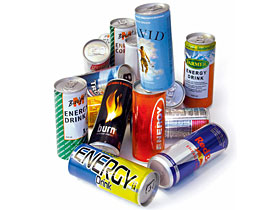
Pupils “hyperventilating” after energy drinks

Fearing strung out students and disorder in the classroom, certain schools in Switzerland have placed restrictions or outright prohibitions on energy drinks.
Now Toni Bortoluzzi, a politician on parliament’s social security and health committee, has called on authorities around the country to ban the fizzy drinks.
“Stimulating beverages should be banned in all schools, even vocational schools,” he told the Sonntag newspaper. “There must be no more hyperventilating pupils in classrooms.”
The Swiss People’s Party parliamentarian has likened energy drinks to a quasi-drug.
“Smoking pot is also not tolerated,” he argued, but said he did not intend to take up the matter in parliament. Instead he urged school authorities, municipalities and cantons to intervene.
Bortoluzzi has received the support of the Swiss Federation of Cantonal Chemists, a body responsible for food safety.
“This goes in the direction of doping,” the group’s president, Peter Grütter, said of the beverages, which can include caffeine, ginseng, ginkgo bilboa and sugar.
Easy access
Switzerland’s teachers’ federation says a ban on a legal product would create more work for its members.
“It is sad that schools will have to worry about this too,” said Marie-Hélène Stäger, the vice-president of the Swiss Teachers Association.
Prices for 250 millilitre cans range from SFr0.90 ($0.78) to SFr1.95 in grocery stores and are significantly higher in kiosks. The labels caution children, pregnant woman and people averse to caffeine to stay away, but there are no rules about selling to children.
Certain authorities have nevertheless chosen to regulate. One primary school in Rümlang, near Zurich, last spring informed parents that the drinks would be no longer tolerated.
“There were always fidgety children that could hardly sit still in the classroom,” said Roland Niesper, the school’s nurse.
“We do not want to see Red Bull on the playground,” he added. Rümlang’s older students are still permitted to consume the drink and authorities have launched an internal campaign to encourage healthy eating.
Caffeine
One can of Red Bull, the world’s most popular brand, contains about as much caffeine as a cup of coffee and youngsters are having problems moderating themselves, says a school headmaster from Gerzensee, in canton Bern.
“Some students come with packs of ten Red Bulls and drink two or three right there,” he said. Energy drinks are banned there, and in the town of Neuendorf, south of Basel.
Migros, the country’s largest grocery retailer, says talk of prohibition is curious.
“It is not our job to look over people’s shoulders,” said Peter Naef, the company’s spokesman. “Energy drinks are legal, so we will sell them.”
In 2004, Europe’s top court upheld a French prohibition on Red Bull. Denmark and Norway have also banned the drink and Britain has warned pregnant women to avoid it.
The Austrian-based firm moves more than three billion cans per year. In Switzerland’s kiosks, it is sold alongside brands including X-Fresh, Body Style and in grocery stores next to cheaper private labels.
Red Bull spokesman Fabio Svaizer told swissinfo that a 250ml can of their product contained the same amount of caffeine as a 500ml bottle of Coca-Cola.
“Those advising children or anybody else should treat all caffeine-containing products the same. It makes more sense for people to use caffeine-containing beverages in a sensible way than banning a whole product category like energy drinks,” he said.
swissinfo, Justin Häne
(per 100 ml)
Co-op value brand
30 mg caffeine
50 calories
SFr.036
Migros value brand
32 mg caffeine
45 calories
SFr0.36
Plan B
32 mg
45 calories
SFr0.50
Red Bull
32 mg
45 calories
SFr0.78
Red Bull sugar-free
32 mg
3 calories
SFr0.78
In response to the explosive growth of energy drinks, a United States firm has created drank, a grape flavoured anti-energy drink.
Containing a combination of valerian root, rose hips and melatonin, the company says the product will “slow your roll” after a chaotic day.
It cautions that the beverage may be “extremely relaxing and calming” and that it “may cause one to lean”.

In compliance with the JTI standards
More: SWI swissinfo.ch certified by the Journalism Trust Initiative

























You can find an overview of ongoing debates with our journalists here . Please join us!
If you want to start a conversation about a topic raised in this article or want to report factual errors, email us at english@swissinfo.ch.